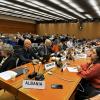News
Displaying Results 1 - 25 of 47
In the face of global crises, progressing towards Sustainable Development Goal (SDG) 16—promoting peaceful, inclusive societies, justice for all, and accountable institutions—is a cross-cutting enabler for the 2030 Agenda. SDG16 intertwines with the other SDGs, underscoring the importance of…
Would you trust artificial intelligence (AI) in your heart? This is not some imaginary, science-fiction scenario. Biomedical companies are already developing pacemakers embedded with AI. Digital technologies like AI are also opening new possibilities such as improved management of natural resources…
Ensuring the principles of environmental democracy are upheld in relation to modified organisms/genetically modified organisms (LMOs/GMOs) can help countries to address biodiversity loss and support progress on a number of Sustainable Development Goals, in particular Goals 2 (zero hunger), 15 (life…
The Protocol on Pollutant Release and Transfer Registers (Protocol on PRTRs) sets international standards for reporting on pollutant releases from a range of economic activities, such as mineral industry operations, plastic production, waste and wastewater management or the rearing of poultry or…
Transparency in the environmental performance of economic activities and effective public access to environmental information, especially on products, are indispensable in addressing pressing environmental challenges. This also supports a just transition towards a green and circular economy,…
The Mediterranean Region, home to over 510 million people, is an important crossroads for economic, social and cultural exchanges between Europe, Africa, Asia and other continents. The region is rich in biodiversity, but has come under pressure due to the intensive exploitation of mineral resources…
Discussions at the recent 33rd annual session of UNECE’s Working Party on Regulatory Cooperation and Standardization Policies (WP.6) focused on how to target continued compliance of products with embedded artificial intelligence, reflecting the importance and the challenge that such products can…
The European Commission has proposed a new legislation, the European Critical Raw Materials Act, to ensure a secure and sustainable supply of critical raw materials for the EU. The Act, on which the European Parliament and the European Council reached a provisional agreement on 13 November,…
According to the 2023 Global Circularity Gap Report by the Circle Economy Foundation, transitioning to a circular economy will allow us to fulfil people's needs with only 70% of the materials we currently extract and use. The benefits of the circular economy are tremendous, as it not only addresses…
Decades of unsustainable consumption and production patterns have resulted in the exhaustion of finite resources and environmental degradation. As governments reassess scenarios, the circular economy model - where resources are reused, recycled, and repurposed to reduce waste - has become a pillar…
The public and civil society have a crucial role to play in tackling key environmental challenges. To make the most of this potential, continued efforts are needed to uphold their rights to shape environmental decision-making.
To this end, the Working Group of the Parties to the Convention on…
For some time now, Uzbekistan has been engaged in various activities under the UNECE Convention on Access to Information, Public Participation in Decision-making and Access to Justice in Environmental Matters (Aarhus Convention).
An international round table entitled “Aarhus Convention: Effective…
As the global economy emerges from the COVID-19 pandemic and governments strengthen efforts to “build-back-better”, trade as an engine of growth has re-emerged in policy agendas. For developing countries and countries with economies in transition that are still in the process of accession to the…
20 May marks the World Metrology Day, celebrating the international system of units, which coincides with the anniversary of the signing of the Metre Convention in 1875. This treaty created the International Bureau of Weights and Measures (BIPM) which coordinate international metrology and the…
Artificial intelligence (AI) is becoming more prominent in the world that surrounds us even if it has existed for a good deal of time. The Internet search engines have been using AI to identify articles that correspond with our search, enabling product advertisers to correlate their marketing with…
Countries are increasingly facing multiple interlinked environmental, social, economic and health challenges – climate change, pollution from chemicals and wastes, biodiversity loss and species extinction, deforestation, land degradation, emerging zoonotic diseases, and the impact of armed…
Standards touch nearly every aspect of our daily life through all the products that we use and consume each day (for example, mobile phones, vehicles, cleaning products, personal protection equipment, toys, and others). When they are produced or introduced on the market, products are checked for…
According to the latest data available reported by the Organization for Economic Co-operation and Development (OECD) in 2019, imports of fake products into the European Union (EU) were up to around 6.8% of all imports. The same year worldwide, counterfeit and pirated merchandise amounted to USD 509…
At its seventy-seventh meeting (Geneva, 13–16 December 2022), the Compliance Committee of the UNECE Convention on Access to Information, Public Participation in Decision-Making and Access to Justice in Environmental Matters (Aarhus Convention) invited fourteen Parties to attend open sessions to…
The UNECE Protocol on Pollutant Release and Transfer Registers (PRTRs) continues to support actions to promote transparency in environmental matters across the globe. It drives the development of national legislation and practice towards a common set of international standards, bringing about…
During her recent two-day visit to Turkmenistan UNECE Executive Secretary Olga Algayerova spoke at international conference “Dialogue is a Guarantee of Peace” in Ashgabat and discussed areas of cooperation with the highest government officials, focusing on future circular, digital and green…
The transition from linear to circular economies requires fundamental rethinking of trade policies and regulations. “Harmonized System” codes (HS codes) are a key pillar of the tariff infrastructure for international trade. These HS codes were designed at a time when circular economy considerations…
Technologies can enhance commerce if clear international standards are in place to ensure that their use is harmonized between trading partners, and if there is regulatory coherence among countries.
Ways in which digital and green transformations can improve quality infrastructure for trade in…
How to develop projects, initiatives and ideas to build resilient energy systems in Central Asia? This was the focus of the 2nd Almaty Energy Forum, held from 14-16 November at the Kazakh-British Technical University. The Forum, a joint effort of four UN organizations – Economic Commission for…
The tenth meeting of the Task Force on Public Participation in Decision-making under the Aarhus Convention (Geneva (hybrid), 10–11 October 2022) focused on effective public participation in decision-making in the context of the coronavirus disease (COVID-19) pandemic and on health-related issues…

























